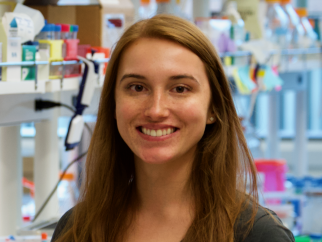
Technical Electives at MIT:
- Systems Microbiology - 20.106
- Molecular and Engineering Aspects of Biotechnology - 20.361
- Cellular & Tissue Biomechanics - 20.310
Audrey Olshefsky
Bachelor of Science in Biological Engineering, MIT, 2016
Professional Experience
Research Associate, Gene Engineering & Delivery Group, Research Department
- Juno Therapeutics
- Designed and constructed chimeric antigen receptor (CAR) T cell plasmids for cancer therapeutic research.
- Optimized and performed an assay that analyzes RNA splicing in primary cells.
- Evaluated several protein tags to detect CARs via flow cytometry.
Educational Experience
Academic:
- Associate advisor for underclassmen
- 21L.S88 Cultural Encounters: Insiders and Outsiders, Prof. Resnick and Prof. Tapscott
MIT Concentration(s):
- Spanish Language
- Culture and Literature
Participation in Programs:
- MIT Independant Activities Period Madrid
- MIT Undergraduate Research Opportunities Program
- Fred Hutch Summer Undergraduate Research Program
Undergraduate Research Experiences:
- Department of Biological Engineering - With Dr. Natalie Kuldell, continued a project beyond 20.109 on optimizing a synthetic two-component signaling system in E. coli.
- Chisholm Lab - Examined metabolic pathways of Prochlorococcus and worked on the development of a genetic system for Prochlorococcus.
- Perez Olsen Lab - designed a targeted RNA interference screen with C. elegans to map the genetic regulation of plasmalogens.
Publications/Posters:
- Poster - Targeted RNA Interference Screen to Map the Genetic Network of Plasmalogens in C. elegans. Fred Hutch Summer Undergraduate Research Symposium, August 2011.
- Publication - Olshefsky A*, Shehata L*, Kuldell N (2016). Site-Directed Mutagenesis to Improve Sensitivity of a Synthetic Two-Component Signaling System. PLoS ONE 11(1): e0147494. *Co-first authors.
Activities, interests and hobbies:
MIT Varsity Sailing Team, GlobeMed at MIT, Kappa Alpha Theta, MIT First Generation Program
Additional Degrees:
University of Washington, PhD in Bioengineering, Expected 2022


